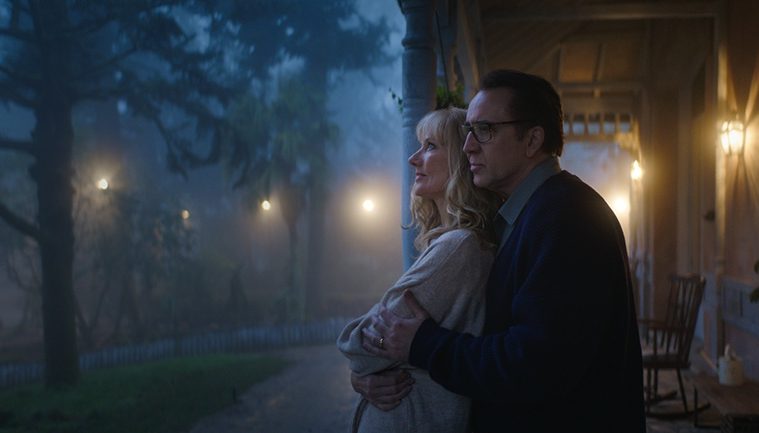But in 2020, if you say the name Nick Cage (what he uses in his daily life, spelled — as he tells us before a recent interview — with a “k” at the end) this illustrious thespian’s past work may not be what comes to mind first. For the last decade or so, Cage’s career has arguably diverged, with the actor staying (very) busy playing intense, bodacious and often downright weird characters in smaller indies. Some of these later roles have been strangely sublime (Mandy, Mom and Dad) while others have been straight-to-video disasters (211, Arsenal), but all of them have one common thread: A performance by Cage that is unforgettably… Cage-ian.
Though he’s been accused of overacting on occasion or phoning it in on others, after rewatching a bunch of his movies and then chatting with him by phone afterward, as L.A. Weekly did last week, it becomes pretty clear that his approach to each role is specific and intentional. When choosing projects, he thinks about the story first, then the director involved and finally the character and how he can bring that person to life.
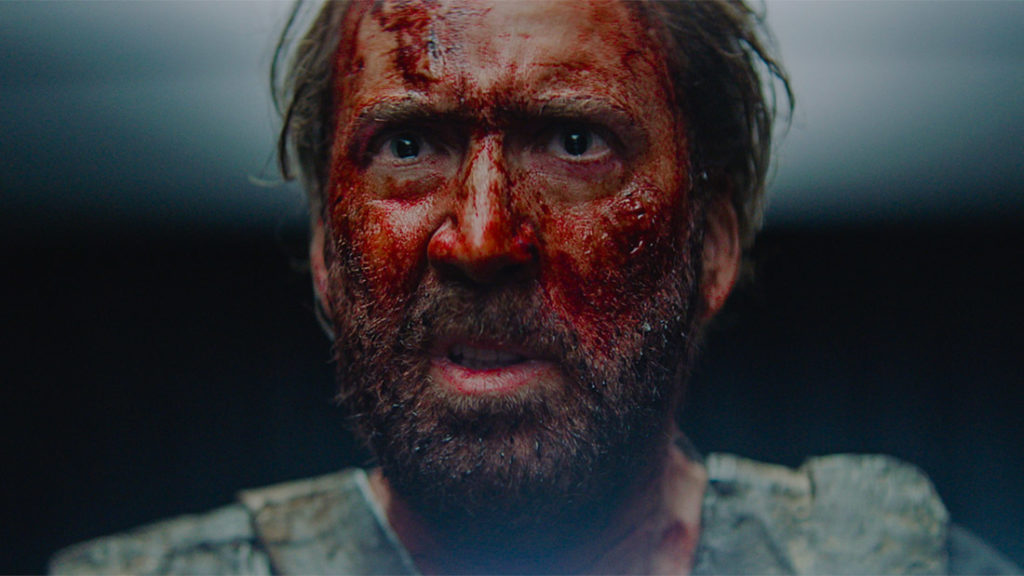
MANDY (RJJE Films)
In the case of his latest, Color Out of Space, all three of these factors came into play, and the result is one of Cage’s most enthralling turns yet. Yes, Elvis has re-entered the building with this one and he is shaking things up big time with the help of director/co-writer Richard Stanley, an auteur seeking his own redemption after a long break from filmmaking. Adapted from an H.P. Lovecraft story, Color is a gorgeously-shot, cosmic nightmare. The Gardner brood, led by dad Nathan (Cage), head off to the woods for some chill time together, but when a meteorite lands in their front yard, they get more thrills and chills than they bargained for. Everything around them becomes enveloped in an otherworldly haze (the “color” referenced in the title); soon it becomes clear that whatever it is, it is seeping into the family’s psyches and their very souls, leaving the patriarch to fend for and fight to save his family.
The tale’s melding of family drama and horror attracted Cage immediately. “It’s one of my favorite of his stories. I’m a pretty big admirer of this kind of writing — such as Edgar Allen Poe and Robert Chambers, which influenced all of H.P. Lovecraft’s amazing tales,” Cage tells us. “That was the main thing that brought me into it — Lovecraft and the idea of having a collision of two different genres. These are two of my favorite genres and I think the most creative people in the business right now are based in horror films. Horror works with the imagination, so you can get a bit surreal and abstract. You’re not bound by a set of physical laws that demand staying in the material universe; you can really go into the realms of the imagination.”
Working with Stanley, he says, was also appealing. “I liked his film Hardware. He went off and did other things for 20 years and so when I found out he was going to do the movie, that made it even more enticing,” Cage says. “You know he’s very good with color in his movies. I knew that with this particular film, and the story — this is a color that no one has ever seen before, and I was thinking, ‘How’s he gonna do that?’ He kept it moving and he kept it kind of underlying in different colors, creating the effect of this unusual blending. I just thought it was quite remarkable.”
Space boasts complex hues in more ways than one. Produced by the same team behind Cage’s last heavily lauded work (Mandy), it provides an almost perfect platform for a Cage-ian performance, as the dad here struggles to make sense of what’s happening while falling into madness. Demented yet heartfelt, Cage really has at it like only he can in this one, and it feels both self-aware and believable. His manic acting style can come off parody-like at times, but it really works here.
“Nick brought a refreshing depth and complexity to the role and I think we turned out to be an unlikely, yet weirdly perfect match,” says Stanley of working with Cage. “We share a proclivity for on-set improvisation, not to mention deadpan apocalyptic black comedy. Nick highlighted certain areas in the script several weeks before shooting where he felt he could bring his considerable improvisational skills to bear, allowing us to develop those sequences further both in the rehearsal period and on the floor.”
“The film’s eventual release to DVD and BluRay will shed some additional light on this process,” adds Stanley. “Including some of the deleted scenes and alternate takes highlighting the extraordinary wealth of possibilities Nick brought to the part. In my past experience, I am accustomed to my leading men slowing down the shooting process, never more so than on the ill-fated Doctor Moreau project, but working with Nick proved to be quite the opposite. It was an experience that will doubtless rank among my most cherished as a filmmaker.”
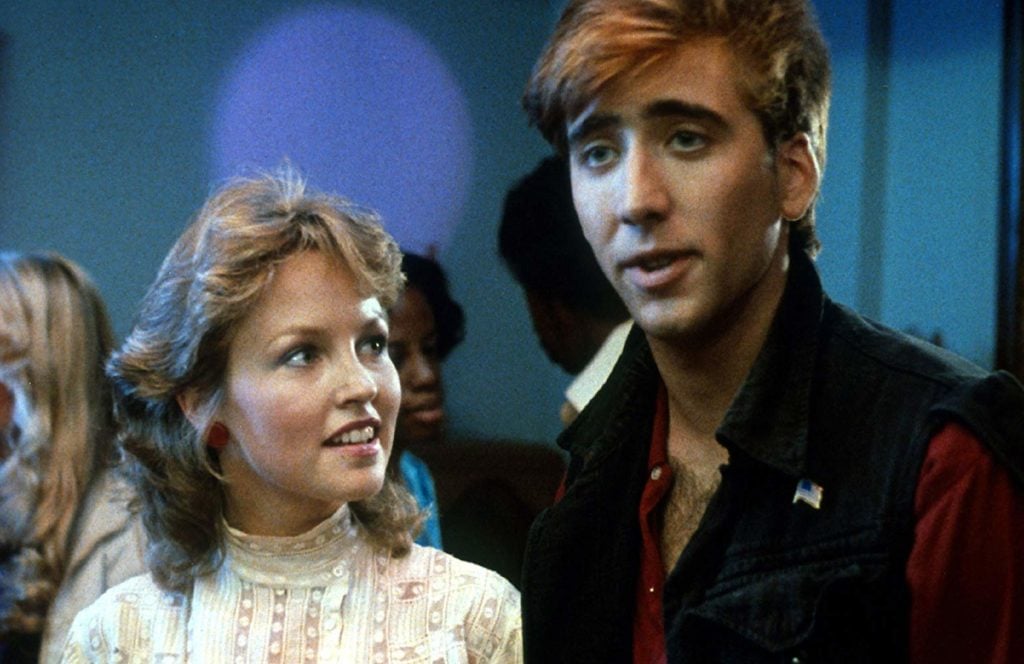
VALLEY GIRL (MGM)
Born in Long Beach and growing up in L.A. (he attended Beverly Hills High School), Nicolas Kim Coppola was pretty much enveloped by filmmaking and performing arts (his uncle is Francis Ford Coppola and his aunt is actress Talia Shire). Always one to make his own path, Nick changed his surname to Cage — reportedly inspired by the Marvel character Luke Cage — just before appearing in his breakthrough role as a punker who falls for a sheltered mall rat in Valley Girl.
His first movie role (listed as Coppola in the credits) was as a stoner pal of Jeff Spicoli in Fast Times at Ridgemont High. He had an early role in his uncle’s second S.E. Hinton adaptation, Rumblefish, and scored appearances in popcorn flicks like The Cotton Club and Honeymoon in Vegas. But even early on, it was the oddball roles in which he shone brightest. The Coen brothers’ Raising Arizona, Robert Bierman’s Vampire’s Kiss and especially David Lynch’s Wild at Heart showcased the actor’s charismatic wackiness, something he honed over the years and brought to even bigger roles. However overwrought some might deem them, Cage’s performances worked so well in heart-pounding blockbusters like Gone in 60 Seconds and the Ghostriders precisely because of — not in spite of — the lack the pretension he brought to these films.
Cage takes aim and fires fervently in all his films, and even if he misses the mark on occasion (which is subjective), he hits it more often than not — and unforgettably so. His go big or go home mentality is not only commendable; it’s enjoyable regardless of whether he sticks the landing. After all “so bad, it’s good” is still good, and in Cage’s case, it can be really good.
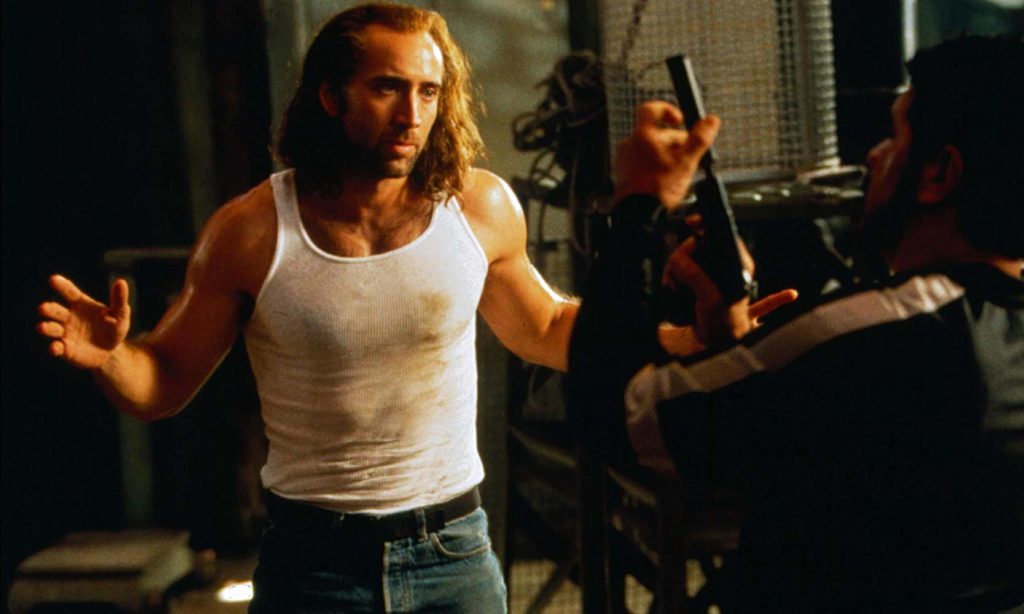
CON AIR (Touchstone Pictures)
“My heroes have been questioned by critics too,” he tells us when we ask about bad reviews and those who critique his acting style. “I think you’re probably doing something right if that happens. I’m trying to find that which is not obvious. And something new to my audience and to me… [I want to] stay not safe and unpredictable. As long as I feel like I did my job, I don’t mind critique. I’m OK with good and bad reviews. You can’t be making movies if you want only positive reviews. It has to come from a place within.”
At 56, Cage is still kinda like the punk he played in Valley Girl — a sweet and sincere dude who does what he wants, has an innate sense of cool and doesn’t really give a shit what the mainstream has to say about it. His wild facial expressions on film have made him a popular meme choice, and his personal life and persona seem to perplex and fascinate the media (from tax problems to failed marriages to his method acting approach) more than ever. But it’s certainly the scope of his cinematic work that has made Cage so enduringly fascinating, even as many mistake his dramatic motivations for arrogance. It’s quite the opposite in fact.
“I still see myself as very much of a student of film performance,” he explains with sincerity. “You have to have the experience or the imagination to play each part authentically and to play it honestly and to bring it to life.”
We ask Nick about his favorite roles and if his perspective on them has changed over the years. “Lord of War, Vampire’s Kiss. I’m very proud of those movies,” he answers. “Some of my favorites are more underrated ones. I think they are maturing well. Some mature differently, and better than others. The Runner, I saw that recently and thought it aged remarkably well.”
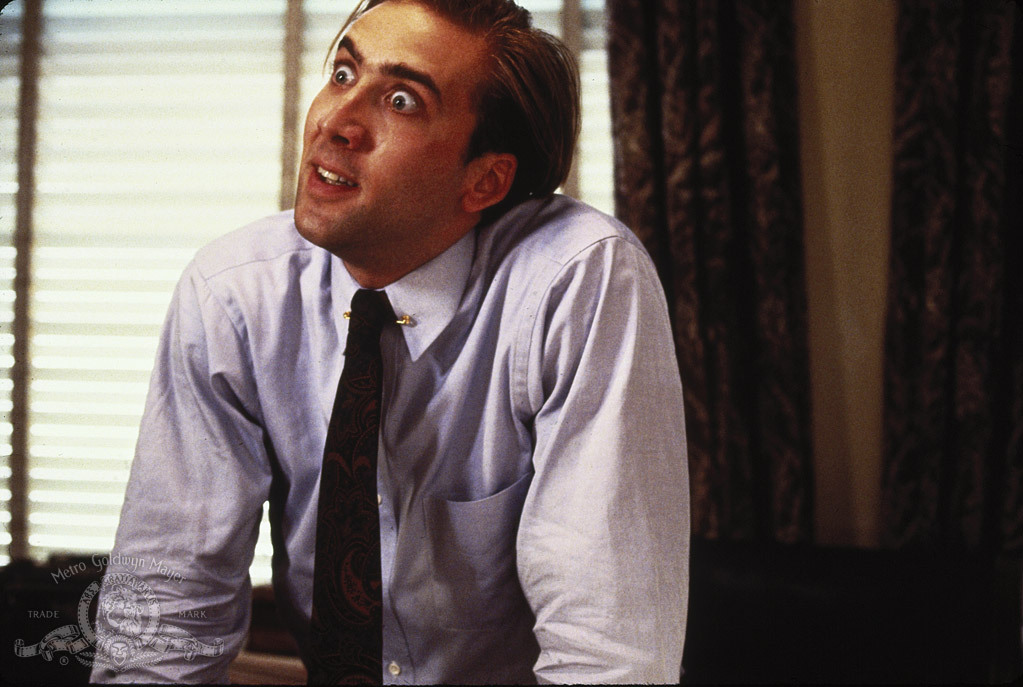
VAMPIRE’S KISS (MGM)
As for the current crop of films this awards season, he expresses a lot of love for Marriage Story. “It isn’t easy to take the ordinary and make it compelling,” he says. “Movies that tell stories that are mundane in a way that make you feel something — that’s powerful.”
Not surprisingly, he also likes Joker (“The approach to issues of mental health was important,” he notes). Joaquin Phoenix’s over the top yet nuanced performance deserves note here too, as it’s not unlike the work Cage has been bringing to the screen for decades — complex, charismatic, comical and disturbing, and often all at the same time. Also, Todd Phillips’ masterpiece has a certain in-on-the-joke (pun intended) subtext concerning the absurdity and darkness of human nature that Cage practically invented onscreen.
Cage’s performance in Color Out of Space brings to mind another Joker — Jack Nicholson in The Shining — but, as Stanley notes, even though the patriarch undergoes a similar degeneration into psychosis, Cage keeps him “a sympathetic and ultimately a tragic figure, something few actors could bring to the screen with such humor and pathos.”
As for what’s next, Cage is not slowing down one bit. (He has no less than five movies currently in pre- and post-production). But the most exciting has to be a just-announced new movie about his life (well, kind of). The Unbearable Weight of Massive Talent will star Cage as “Nicolas Cage,” but in some kind of alternate universe. Providing the actor with a chance to address his enigmatic persona and critics head-on, he’ll play multiple roles — one being an egotistical version of himself from the past who takes him to task for making too many crappy movies. “It’s a kind of fantastic interpretation of myself based on perceptions on the internet,” he explains enthusiastically. “It’s not entirely accurate, but at the end it’s a positive celebration of all my movies. It’s kind of meta.”
A movie that’s both meta and Cage-ian? The actor seems to have more hues inside of himself and we can’t wait to see them revealed.
Color Out of Space is in theaters now and VOD/Digital February 25.
Advertising disclosure: We may receive compensation for some of the links in our stories. Thank you for supporting Irvine Weekly and our advertisers.

